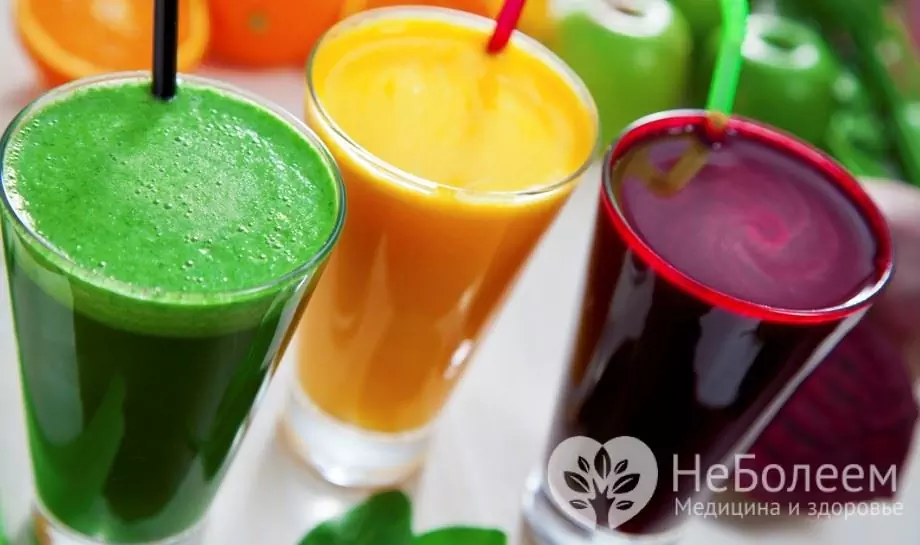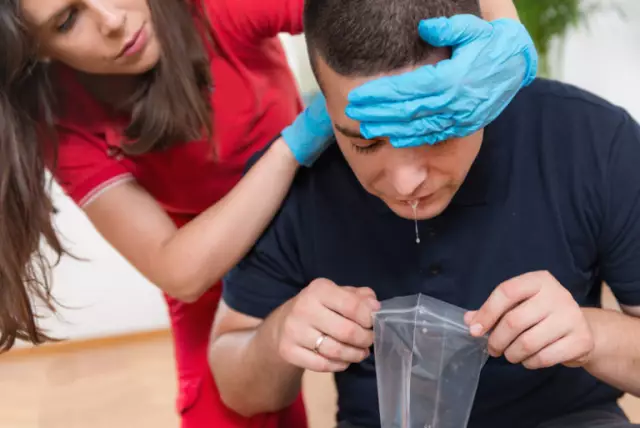- Author Rachel Wainwright wainwright@abchealthonline.com.
- Public 2023-12-15 07:39.
- Last modified 2025-11-02 20:14.
Juice poisoning
Juices made from vegetables and fruits are very popular. They are absorbed by the body much better than the fresh vegetables and fruits from which they were prepared, while they contain vitamins and minerals in high concentration. That is why doctors recommend regular use of fruit and vegetable juices in baby food, as well as for people who are often sick.

Source: depositphotos.com
Juices show all their beneficial properties only when they are prepared from quality products in compliance with all sanitary and hygienic requirements. Otherwise, drinking the juice can lead to poisoning.
How does juice poisoning happen?
The main cause of juice poisoning is violation of sanitary standards during its production and storage. At the same time, food intoxication can be obtained after consuming both industrially manufactured juices, packed in sealed packaging, and fresh juice (freshly squeezed juice).
The fact is that vegetables and fruits contain sugars: glucose, fructose. They are an excellent environment for numerous pathogenic microorganisms: staphylococci, streptococci, shigella, salmonella, Escherichia coli, etc. Once in the juice, bacteria are active, multiplying and producing toxins. When low-quality juice is consumed, bacteria along with toxins enter the gastrointestinal tract, causing inflammation of the mucous membranes and increased peristalsis. These pathological changes lead to the development of symptoms of gastritis, enteritis and colitis. Toxins have the ability to be absorbed from the gastrointestinal tract and enter the general bloodstream. This causes general intoxication of the body, which is manifested by a sharp deterioration in well-being.
Poisoning symptoms
Juice poisoning proceeds as a food toxicoinfection. The first symptoms appear 2-3 hours later after consuming a poor-quality product. These include:
- nausea;
- vomiting;
- diarrhea;
- cramping pain in the abdomen, which is somewhat relieved after a bowel movement;
- increased body temperature;
- headache and muscle pain;
- increased feeling of thirst;
- lack of appetite.

Source: depositphotos.com
First aid for juice poisoning
In case of juice poisoning, it is imperative to rinse the stomach. This procedure allows you to remove toxic substances from it, which will stop their further absorption and reduce the severity of poisoning. For gastric lavage at home, a simple method called "restaurant" is used. The patient is given about a liter of pale pink solution of potassium permanganate or warm salted water to drink. Then, if vomiting did not come on its own, it is artificially induced, irritating the nerve endings located in the region of the tongue root.
After washing the stomach, the patient should take a suspension of activated carbon. To prepare it, you need to crush tablets into powder (at the rate of 1 tablet for every 10 kg of body weight) and mix the resulting powder with a small volume of water. Instead of activated charcoal, you can give Smecta, Filtrum STI or any other drug with an absorbing effect.
First aid for juice poisoning includes oral rehydration. To do this, the patient is given to drink as much liquid as possible (mineral water without gas, acidified with a few drops of lemon juice, unsweetened weak tea, Rehydron's solution). You can not drink a large volume of liquid at once, as this will provoke vomiting, you should drink often in small sips.
When is medical attention needed?
Juice poisoning in most cases passes quickly, first aid measures are sufficient, so patients do not go to the doctor. But if the poisoning happened in people with weakened immunity (children, pregnant women, the elderly and often ill), medical attention is needed.
Also, medical attention is needed in the following situations:
- the symptoms of poisoning persist in the patient for more than two days;
- weakness is growing;
- drops in blood pressure;
- the amount of separated urine decreases, it acquires a rich dark color;
- sharp abdominal pains, the intensity of which does not decrease after a bowel movement;
- neurological disorders appear (fainting, convulsions, etc.).
Treatment of patients with juice poisoning is carried out in the infectious diseases department. Prescribe detoxification therapy, which includes intravenous glucose, saline solutions, vitamin preparations. In some cases, the prescription of broad-spectrum antibacterial drugs is justified.
In the acute period of juice poisoning, as well as during recovery, patients should follow Pevzner's therapeutic diet No. 4, mechanically and chemically sparing for the gastrointestinal tract. If necessary, your doctor may prescribe medications to improve digestion.
Possible consequences
Most often, juice poisoning passes very quickly and does not leave any negative consequences. But in the case of severe poisoning, the patient may develop dehydration. This condition is most dangerous for young children and can cause hypovolemic shock and acute renal failure.
In some patients, after juice poisoning, dysfunction of the digestive system persists for a long time, which is manifested by abdominal pain, unstable stools. This condition is caused by a disturbance in the normal balance of the intestinal microflora. In this case, eubiotics and probiotics are recommended, as well as fermented milk products.
Prevention
In order for the use of juices to bring only benefits, it is important to observe the following rules:
- buy juice in trusted stores and from reliable producers;
- do not purchase juice, the packaging of which has visible damage;
- be sure to check the expiration date;
- after opening the package, store the juice in the refrigerator for no more than 3 days;
- do not drink draft juices sold in street stalls;
- for the preparation of fresh juice, use only high-quality vegetables or fruits, and also carefully observe sanitary standards.
YouTube video related to the article:

Elena Minkina Doctor anesthesiologist-resuscitator About the author
Education: graduated from the Tashkent State Medical Institute, specializing in general medicine in 1991. Repeatedly passed refresher courses.
Work experience: anesthesiologist-resuscitator of the city maternity complex, resuscitator of the hemodialysis department.
The information is generalized and provided for informational purposes only. At the first sign of illness, see your doctor. Self-medication is hazardous to health!






